

China threatens foreign journalists, imposes new rules. SAGE Journals Online. The Little Red (Face)Book. When I spoke at Facebook about In The Plex recently, rumors were swirling that the social networking giant was about to enter China, supposedly in a partnership with the search engine Baidu.
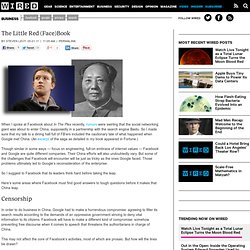
So I made sure that my talk to a dining hall full of FB’ers included the cautionary tale of what happened when Google met China. (An excerpt of the saga as detailed in my book appeared in Fortune.) Though similar in some ways — focus on engineering, full-on embrace of internet values — Facebook and Google are quite different companies. Their China efforts will also undoubtedly vary. But some of the challenges that Facebook will encounter will be just as tricky as the ones Google faced. Working Paper No. 18. JPRI Working Paper No. 18: April 1996 Japan's Press Clubs as Information Cartels by Laurie A.
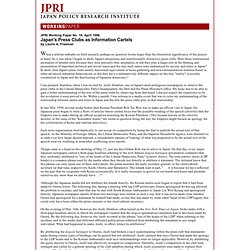
Freeman When a scholar embarks on field research, perhaps no question looms larger than the theoretical significance of the project at hand. So it was when I began to study Japan's ubiquitous and institutionally distinctive press clubs. New Leaders in Japan Seek to End Cozy Ties to Press Clubs. Ink Gushes in Japan’s Media Landscape. Shiho Fukada for The New York Times Ken Takeuchi, founder of JanJan, at its empty office in Tokyo in May.
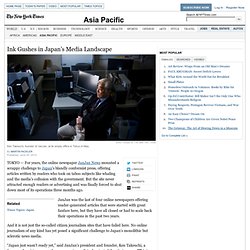
JanJan was the last of four online newspapers offering reader-generated articles that were started with great fanfare here, but they have all closed or had to scale back their operations in the past two years. And it is not just the so-called citizen journalism sites that have failed here. The Media. With the economic development that started in the 1980s and the arrival of the Internet in the 1990s, Chinese media have become more diversified as they extend their reach throughout China through multiple transmission, including satellites, wireless and wired systems.
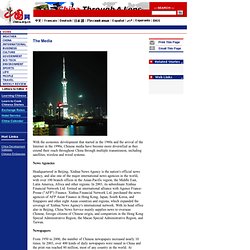
News Agencies Headquartered in Beijing, Xinhua News Agency is the nation's official news agency, and also one of the major international news agencies in the world, with over 100 branch offices in the Asian-Pacific region, the Middle East, Latin America, Africa and other regions. In 2003, its subordinate Xinhua Financial Network Ltd. formed an international alliance with Agence France-Presse ("AFP") Finance. Xinhua Financial Network Ltd. purchased the news agencies of AFP Asian Finance in Hong Kong, Japan, South Korea, and Singapore and other eight Asian countries and regions, which expanded the coverage of Xinhua News Agency's international network. Newspapers Radio Television. Cyber Speech — Catalyzing Free Expression and Civil Society.
Map of Press Freedom. Of the 196 countries and territories assessed during calendar year 2009, 69 (35 percent) were rated Free, 64 (33 percent) were rated Partly Free, and 63 (32 percent) were rated Not Free.
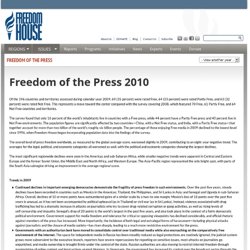
This represents a move toward the center compared with the survey covering 2008, which featured 70 Free, 61 Partly Free, and 64 Not Free countries and territories. The survey found that only 16 percent of the world’s inhabitants live in countries with a Free press, while 44 percent have a Partly Free press and 40 percent live in Not Free environments. The population figures are significantly affected by two countries—China, with a Not Free status, and India, with a Partly Free status—that together account for more than two billion of the world’s roughly six billion people. Reporters Without Borders. Closing the shop: information ... China tells foreign journalists to respect rules after scuffles at non-protest.
Chinese officials have warned foreign journalists they need advance permission to report from parts of Beijing and must not do so from a particular spot in Shanghai, marking an apparent tightening of media restrictions.
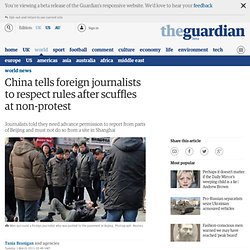
A foreign ministry official appeared to blame the move on overseas journalists who said they were harassed at the site of proposed protests that did not materialise. Bloomberg News said men who appeared to be plainclothes police kicked and beat its cameraman in front of uniformed officers on Sunday, and a BBC correspondent said he and a colleague were roughed up and thrown into a van. Five news organisations reported having equipment confiscated or materials destroyed and other journalists were detained, delayed or manhandled as they reported from the site of proposed "jasmine revolution" protests, according to the Foreign Correspondents' Club of China.
No one knows who has made the calls for demonstrations, which were posted on an overseas website. Reporters Harassed for Reporting on Lack of Protests. Gov't Briefings. Reporter Shadowed by Officials During Sichuan Quake Reporting. The week of June 7, Marianne Barriaux of Agence France Press encountered interference while reporting in the Sichuan earthquake zone.
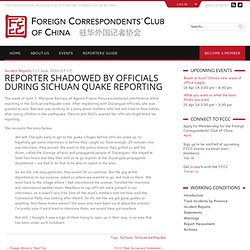
After registering with Dujiangyan officials, she was granted access. Barriaux was working on a story about mothers who had and tried to have babies after losing children in the earthquake. Parents and NGOs warned her officials might block her reporting. She recounts the story below: We left Chengdu early to get to the quake villages before officials woke up, to hopefully get some interviews in before they caught us. Welcome to Facebook - Log In, Sign Up or Learn More.